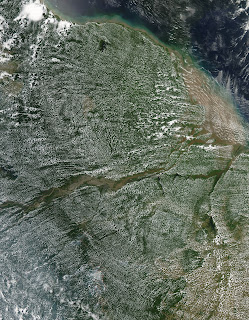"Optimization" of the Water Cycle - Discussion
Not optimization of a computer algorithm about the water cycle... Optimization of the physical water cycle itself…! That sounds weird, doesn't it?
It's painful to observe most human interventions on earth have resulted in
some destruction in the ecosystem. It's hard to say we have contributed to its
rejuvenation. Can the proposal presented below serve the restoration of
the "default climate behavior" of the earth while having no side effects or
negligible, compared to scary risks awaiting us?
I have an idea and I need to discuss it with experts of the broader topic.
Any insight shared has a potential to affect the direction of our research
on natural cooling techniques.
An Example Case
Let's start with a photograph which is absolutely
fascinating. It is an aerial image from part of the Amazon jungle. It shows formation
of clouds on the rainforest as a result of evapotranspiration. The original
file is pretty large (13 MB), so the image below links to a medium-sized
preview. To enjoy the scenery in full resolution, please
click here. 1

|
| Afternoon Clouds over the Amazon Rainforest @ Wikipedia article "Transpiration" |
The larger body of water looks like sea, probably the Atlantic, while it
could be a lake too. All the way from left to right in the middle is a river
and to the right of the photo is a river delta.
Let's Zoom in
Here are a few snapshots from the image. The first one shows the main
river running through the rainforest. In the second are a small lake and
the presumed sea. There is no observable cloud formation or accumulation
above various bodies of water, regardless it is fresh or salty, flowing or
still... whereas green areas of trees are totally covered with tiny
clouds.
I assume the masses seen below are just waves reflecting sunlight. There might
be partial wind in that area, causing waves.
Interpretation and Discussion
The water bodies, i.e. river, lake, and sea, do evaporation. The forest does
evapotranspiration, which refers to the sum of evaporation from soil plus
transpiration from trees and plants. Per unit area, evapotranspiration must be
far "faster" in releasing water molecules to air than evaporation. In other
words,
a certain size of land with vegetation produces a lot more vapor for the
atmosphere compared to any type of water body does. Is this inference correct? (I would appreciate if someone shares a
couple studies comparing vaporization performance of evaporation of water
bodies vs. transpiration of forests, with consideration given to temperature,
humidity, and wind conditions.)
Conclusion and Discussion
If the answer to the previous question is "Yes", then
can we conclude that "rain water (and stream water as much as possible) in the water cycle must
be utilized or vaporized before they reach seas, in order for the formation
of sufficient cloud in the atmosphere and consequently to avoid a global
drought"?
(I assume lakes need fresh water for habitats they host. If it is known that
the sea and the ocean also need some extent of fresh water, for any reason,
that can be considered. I have no clue on this.)
If the answer is "Yes" again, then:
- we have to direct rain water, which is wasted by letting flow to seas, to uses such as agriculture, afforestation, and evaporative cooling.
- we have to focus on rain water harvesting, consider small dams at more locations, and take advantage of cisterns wherever possible. Cisterns under each driveway or one for each block...
- we have to find more effective ways of feeding aquifers. Shallow holes under small dams might help water seep down into soil and reach aquifers.
- total vaporization on earth resulting in more rain hopefully.
- prevention of floods since excess rain water is stored locally.
- available fresh water resources.
Why I wrote this article?
Our research on evaporative cooling techniques required us to find answers to
the questions above. Not to mention our globally common concern on what kind
of an earth we will leave to our grandchildren...
There are other things I need to share on these issues. Hopefully, more
soon...
Now... Your Part
Please go ahead and comment below if you have anything to share. Your
contribution is much appreciated. Thank you!
1. I wanted to keep the link to the image on Wikipedia's server. Just click here. ↩




Comments
Post a Comment